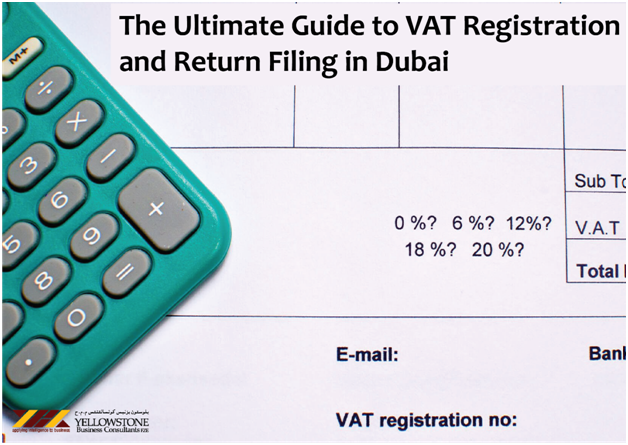- November 30, 2021
- Posted by: ybc_admin
- Category: Uncategorized


Fig. 1:The Ultimate Guide to VAT Registration and Return Filing in Dubai Blog
Before we get into it, let’s understand what is VAT?
VAT (Value Added Tax) is a significant government tax levied on the added value of goods and services before they reach the final customer. All enterprises that are actively involved in the manufacturing and production of goods or services must register for VAT. It is one of the most essential measures taken by the UAE government to enhance its economy. This is the country’s first tax.
VAT was recently introduced in the UAE and is now mandatory for businesses with an annual turnover of AED 375,000 or more. That being said, business owners and investors must know and understand the process of VAT registration in Dubai, as well as the process of VAT return filing in Dubai, which we will cover in this article.
What is VAT registration and why is it important?
A firm that is registered under the VAT law is recognized by the government as a supplier of goods and services and is entitled to collect VAT from customers and submit it to the government.
If your company’s revenue exceeds a certain amount in the last 12 months and you haven’t registered for VAT, you will face a penalty of AED 20,000. Businesses must not take the process of VAT return filing and submission lightly, since failure to do so might result in major penalties. As a result, many companies opt for hiring professional services in Dubai for VAT which can help to execute the necessary measures on time to benefit the firm.
VAT registration in Dubai is not always required for those who run a small business. However, it is important to take into account, particularly if your company’s taxable supplies exceed AED 375 000 per year. Companies that file VAT returns in Dubai have a better reputation with the authorities.
Is VAT registration in Dubai mandatory for all businesses?
No, VAT is only levied on businesses that sell more than a certain amount of goods or services in a given year. The corporation may or may not be authorized to register for VAT, depending on the registration threshold. Alternatively, the business can apply for registration or ask for a VAT tax exemption.
VAT-registered UAE can be classified into the following groups:
- Mandatory VAT registration Dubai
- Voluntary VAT registration UAE
- VAT registration UAE exemption
The criteria for VAT Registration in Dubai

Fig. 2:TheCritreia of VAT Registration in Dubai
For Gulf Cooperation Council (GCC)-based firms
Mandatory registration
If you own a business in the GCC and make supplies of goods or services in the UAE, you must register for VAT when the law goes into effect.
- You had a turnover of more than AED 375,000 in the previous 12 months;
OR
- You expect a turnover of more than AED 375,000 in the next 30 days.
Voluntary Registration
You do not need to do VAT registration in Dubai unless you are eligible under VAT law, keeping in mind the following points:
- In the past 12 months, your turnover or expenses (which will be liable to VAT) totaled more than AED 187,500
OR
- In the next 30 days, you estimate your turnover or expenses (which will be subject to VAT) to exceed AED 187,500.
VAT may not apply to all goods and services.
VAT does not apply to all goods and services; thus it is not a one-size-fits-all charge for all businesses.
Some goods and services are exempted or zero-rated from VAT, which means you won’t have to pay any VAT (and you won’t be able to charge clients or collect VAT returns on goods and services you’ve already paid for).
Examples of zero-rated products and services include some educational services, some investment-grade precious metals, export beyond the GCC, and some healthcare services. Vacant land, residential real estate, and local transportation services are all exempt from VAT.
What is the procedure for applying for VAT registration services in Dubai?
Businesses are required to register for VAT by law. While the government announces deadlines based on business turnover or kind of VAT from time to time. You should also be familiar with the application procedure. This will help you understand the details you’ll need to finish your application and prepare the essential paperwork ahead of time.
You’re required to create an account on the FTA’s eService Portal.
Once you connect to your account, you’ll discover an online VAT registration form. The following information will be needed when filling in the form:

Fig. 3:Filling the VAT Registration form
- Detailed information about your business
- Personal information
- Your company’s contact information
- Bank account information
- Any business links must be declared.
- Information about how to register for VAT. (This is provided by the FTA.)
- A declaration for services such as VAT registration in Dubai
- When you’ve finished filling out all of the fields, click Review and Submit
VAT Return
A VAT Return (also known as a tax return) is a periodic statement that outlines the value of a taxable person’s supplies and purchases made during the tax period. It represents the taxable person’s VAT liability, which is the difference between the output tax owed and the input tax that can be reclaimed.
Benefits of VAT Return Filing in Dubai
- VAT compliance brings with it some business goodwill. Many large corporations are often hesitant to do business with non-VAT-registered companies.
- Once registered under VAT law, the company’s image improves.
- VAT is simpler to administer than any other indirect tax.
How to deal with VAT Return Filing in Dubai effectively?
In Dubai, all taxable businesses are required to file a VAT return. The company will receive a Tax Registration Number after applying for VAT registration (TRN). Three months is the standard tax period (quarterly).

Fig. 4: Expert VAT Return Filing in Dubai
The filing of a VAT return refers to the submission of a form containing information about VAT-related sales and expenses incurred during a specific tax period. Filing VAT returns in the UAE helps businesses to understand the amount of VAT that will be reclaimed or refunded.
The purpose of VAT return filing in Dubai is to ensure that all taxable enterprises meet the FTA’s statutory obligation. To avoid penalties, businesses that are VAT registered must submit the VAT return and pay the taxes owed within the time frame set by the Federal Tax Authority (FTA).
Here are the steps that must be taken to process the filing of VAT returns.
- Open an account with the Federal Tax Administration.
A VAT-registered business in the UAE must hold an account with the Federal Tax Authority (FTA).You must have an account to begin the filing procedure. To guarantee that all information submitted to the tax office is correct, it is essential to tie up with an organization that can provide professional services in Dubai to create an FTA account.
- Provide the FTA with information about the taxpayer.
Once the VAT return filing process has been initiated by creating an FTA account, the next step is to provide the regulatory body with information about the business, such as name, address, and TRN or tax registration number. If a licensed tax consultant is employed to assist with the process of VAT registration in Dubai, the expert can fill in the necessary details on the company’s behalf.
- Keep track of all VAT sales, expenses, and other inputs in your accounting system.
The FTA must receive all required information on a business’s VAT sales and costs for a single financial year. Exempt supplies and zero-rated supplies, among other things, must be indicated. Details on expenses made at a rate of 5%, which is the current VAT rate, must also be given.
- As a result of the FTA, determine the Net VAT
After the VAT sales, expenses, and other associated inputs have been provided, the net VAT due by the business must be calculated. The VAT due amount must be paid to the tax authority if it is higher than the recoverable amount. If the recoverable amount is greater than the amount due to the FTA, the difference can be reimbursed to the firm through the VAT reclaim or refund process. The computation that must be supplied to the FTA represents the amount of tax payable by the business for each tax period.
- Create a Declaration
Lastly, a declaration regarding the accuracy of all information supplied to the FTA must be submitted.
This is the procedure for filing VAT returns to the Federal Tax Authority of the United Arab Emirates. Corporate entities must be cautious when presenting information to the FTA on the VAT return. Providing false information can result in heavy penalties. Hiring a certified tax agent or professional services in Dubai is one way to avoid accumulating hefty fines and penalties as a result of erroneous VAT return filing details.
Common mistakes/problems people face during the process of VAT return filing in Dubai:
- There is a lack of clarity regarding zero-rated vs. standard-rated VAT.
The general belief is that anything outside the UAE is zero-rated. Though that may be correct as a general statement, there are some specific things to consider, such as where the source of supply is located (because some types of supplies such as real estate, events, and so on, are subject to particular rules)
A sale outside of the UAE may also be out of the question. Authorities require certain documents to qualify as a zero-rate supply, such as acquiring a customs-exit document. If there is a lack of clarity on this, the corporation may face severe fines.
- The format of a tax invoice was followed incorrectly
Are you aware that each tax invoice issued in the incorrect format is subject to a penalty of AED 5,000 during VAT return filing in Dubai? According to UAE cabinet resolution No 40, failing to issue a tax invoice when making a supply can result in a penalty of AED 5,000 per tax invoice.
- Inability to validate the supplier’s tax number
The standard practice is to assume that whatever the supplier says about the TRN number is correct without checking it on the FTA website. This can cause issues, particularly during a tax audit.
- Making a VAT claim on personal costs
Personal spending cannot be mixed in with business operations, and just though the firm reimbursed those charges does not make them into business expenses. One of the most prevalent mistakes is claiming personal costs through the corporation.
- Changes to the FTA VAT site are not being updated
According to the rules, taxable businesses must update their VAT registration in Dubai on the portal whenever they make any changes, such as opening a new branch, changing their office location, changing their bank details, changing their shareholder information, and so on, which has repeatedly been found to be ignored.
- Charging input VAT on expenses that aren’t allowed
Certain expenses, such as entertainment expenses, car expenses linked to vehicles accessible for personal use, and so on, are not tax-deductible. However, in many circumstances, such VAT is claimed, resulting in tax penalties for the corporation.
For hassle free VAT registration and VAT Return Filing in Dubai-

Fig. 5:Offering Hassle free Professional Services in Dubai
It is important to have a professional who can ensure that the company has filed verifiable information, ensuring that it is not penalized. The specialist can also assist you in carrying out the procedure with little or no involvement on your part. Furthermore, a tax regulated agent in Dubai is well-versed in VAT legislation, as well as the implementation of procedures that may be requested by the UAE’s tax authority.
By correctly directing businesses, we provide the best VAT services and help them avoid VAT fines and penalties. Many companies around the UAE rely on us to provide the best and timely services regarding VAT return filing in Dubai.
We are UAE’s most trusted tax consultant, and we offer the best professional services in Dubai. Businesses face challenges as they prepare for VAT, just as they do with any new legislation. In Dubai/UAE, we have an exclusive team of trained VAT Consultants. Our team will assist you in navigating the new tax laws with ease.
If your company is unfamiliar with the FTA’s standards and regulations, it is strongly advised that you get assistance.






